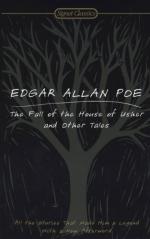|
This section contains 7,356 words (approx. 25 pages at 300 words per page) |

|
SOURCE: "The Perverse Strategy in 'The Fall of the House of Usher'," in New Essays on Poe's Major Tales, edited by Kenneth Silverman, Cambridge University Press, 1993, pp. 45-64.
Kaplan is an American psychoanalyst. In the following essay, she presents a psychoanalytic interpretation of "The Fall of the House of Usher."
Edgar Allan Poe was a dissembler, a hoaxter, a liar, an impostor, and plagiarizer. He was secretive about his true identity and frequently masqueraded under one of several aliases. Deception and mystification were Poe's stock-intrade. Nevertheless, about some things we take him at his word. He truly was, as he boasted, a master of perversion, that most deceptive of mental strategies. We have only to recall his persistent and active pursuit of mental and physical self-destruction—the drinking, his habits of provocative and violent argumentation, the alienation of his guardian and other authority figures who might otherwise have...
|
This section contains 7,356 words (approx. 25 pages at 300 words per page) |

|


